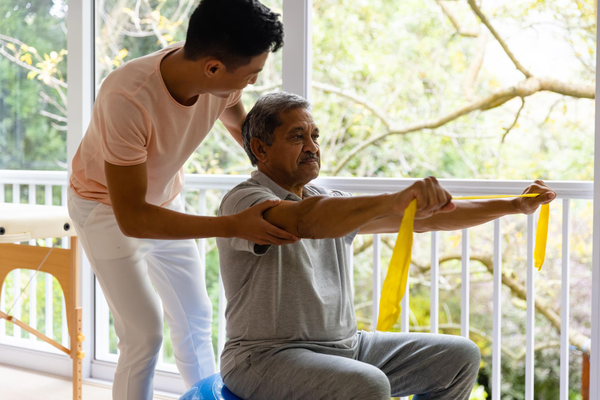
Last updated on by MRC
Aphasia, a life-altering speech disorder, can profoundly impact one’s ability to communicate, making even the simplest interactions a struggle. However, thanks to advancements in aphasia treatment, there’s hope for individuals to regain their voice and rebuild their lives. Speech therapy is at the forefront of this journey, enabling patients to overcome the barriers posed by aphasia. This comprehensive guide talks about everything you need to know about aphasia, its causes, symptoms, while highlighting how speech therapy can make a transformative difference.
Aphasia is a speech disorder that affects a person’s ability to process and articulate language. It is not a disease but rather a result of damage to the brain’s language centers, often in the left hemisphere. It is commonly linked to strokes or traumatic brain injuries. Aphasia disrupts speaking, writing, reading, and understanding speech, which can hinder one’s personal and professional life. People with aphasia may experience frustration and isolation due to their inability to express themselves or comprehend others.
The condition can vary in severity, ranging from difficulty finding words to complete loss of communication skills. It is crucial to understand that aphasia does not affect intelligence—individuals with aphasia can think and reason just as they did before.
Aphasia is a neurological condition that impairs a person’s ability to process language. It can affect speaking, understanding, reading, and writing, leading to significant disruptions in communication. Despite the challenges, aphasia does not affect intelligence.
Often referred to as “non-fluent aphasia,” individuals with Broca’s aphasia struggle to form complete sentences but can understand spoken language relatively well.
Known as “fluent aphasia,” this type affects comprehension. While individuals can speak fluently, their sentences often lack meaning or context.
The most severe form, global aphasia, impacts both understanding and production of language, leaving the individual with minimal ability to communicate.
The mildest form, this type is characterized by difficulty in finding the right words, especially nouns and verbs, despite having otherwise normal speech.
Understanding the type of aphasia a person has is vital for tailoring effective aphasia treatment approaches.
The primary aphasia causes are injuries to the brain’s language-processing areas, typically in the left hemisphere. Here are some common triggers:
Identifying the underlying aphasia causes is essential for devising effective aphasia treatment approaches.
The symptoms of aphasia can vary widely depending on its type and severity. Common signs include:
These symptoms may overlap with other speech disorders, making early diagnosis and intervention crucial.
Do you know: What signs indicate a need for speech therapy?
Speech therapy is a cornerstone in aphasia treatment, offering structured exercises and techniques to help individuals rebuild their communication skills. Here’s how it works:
Know more: A Comprehensive Guide to Speech Therapy Techniques
Speech therapy uses repetitive and targeted exercises to retrain the brain. Activities like naming objects, forming sentences, and practicing conversational skills help stimulate neural connections.
For individuals with severe aphasia, therapists may introduce augmentative and alternative communication (AAC) tools such as communication boards, speech-generating devices, picture boards, apps, or gestures to facilitate expression and understanding.
Each patient’s challenges are unique, so are the therapies. Speech therapists design customized plans to focus on specific difficulties, ensuring a tailored approach for better outcomes. For instance, someone with Wernicke’s aphasia may need more focus on comprehension, while Broca’s aphasia patients may work on sentence construction.
Aphasia can lead to frustration, depression, and isolation. Speech therapy provides a supportive environment for patients to rebuild confidence and express themselves.
Aphasia often affects memory, problem-solving, and concentration. Speech therapy incorporates cognitive exercises that improve overall brain function, indirectly supporting communication.
Therapists encourage families to participate in sessions, teaching them effective ways to communicate with their loved ones. This not only helps the patient but also strengthens family bonds, invaluable in creating a nurturing environment for recovery.
For those seeking speech therapy in Kolkata, the Medical Rehabilitation Center (MRC) is a trusted choice. We provide physiotherapy, paralysis treatment in Kolkata, and pain management services with a multidisciplinary team catering to all pain and paralytic disorders. We focus on diagnostics, medical treatment, and integrated therapeutics to offer holistic care in a comfortable environment, operating 365 days a year.
Research into aphasia is advancing rapidly, focusing on innovative aphasia treatment approaches such as:
These advancements offer hope for improving outcomes and understanding the complexities of this speech disorder.
Aphasia is a challenging condition, but with the right support and therapy, individuals can rebuild their communication abilities and reclaim their independence. Whether you or someone you know is affected by aphasia, early diagnosis and professional intervention are critical for recovery.
You can encourage the person with aphasia to use other ways to communicate, such as:
Not all affected by aphasia require treatment. If the brain damage is mild, a person may regain all their previous language skills without treatment. However, most people undergo speech and language therapy.
Use drill exercises to focus on specific speech, language or cognitive skills. Drill work should be time-based, meaning that your patient should work on the same activity until the scheduled practice time is up. Drill exercises may include: Reading aloud or silently.









